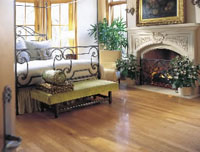|
Cleaning Wood Floors
Clean Wood Floors
General Care
In cleaning wood floors, regularly sweep or vacuum the floor to prevent sand or abrasive dust from
accumulating and scratching the finish.
Place doormats outside and rugs inside at every entrance of the house, again to
prevent sand or abrasive dust from accumulating on the floor.
Place a rug in front of the kitchen sink, kitchen working stations, and the
dishwasher to protect the floor from dropped kitchen accessories and from water
or oily detergent spills.
Use adequate floor protection (wood floor protector pads) under all furniture
and chairs legs, in order to ease their movements and to prevent scratching the
floor.
The relative humidity level in your home must be maintained at 45% (i.e. 40-50%)
throughout the year. Hardwood is a living substance which reacts to changes of
relative humidity. It absorbs or releases humidity according to seasons.
Consequently, its dimension changes. In summer, when humidity is at its highest,
it is absorbed by the wood which then expands. These variations can be minimized
with proper ventilation, dehumidifying or heating. In winter, on the other hand,
when the heating system is on, the relative humidity level in the house is much
lower. It is then recommended to use a humidifier, in order to minimize extreme
shrinkage effects
Keep "high heel" shoes in good condition. Damaged or worn high heels may expose
a metal tip which will certainly damage your hardwood floor.
Protect your floor against direct sunlight or any intense source of artificial
lighting. Over time, intense light will discolor exposed surfaces. This
phenomenon with wood surfaces is normal and natural. The lighter the color of
the natural wood, the more apparent this phenomenon will be.
Maintaining a Surface Finish
Surface finishes are very popular today because they are durable,
water-resistant and require minimal maintenance. Surface finishes are blends of
synthetic resins. These finishes are most often referred to as urethanes or
polyurethanes, and remain on the surface of the wood to form a protective
coating. They are generally available in high-gloss, semi-gloss and satin.
Dust mop, sweep or vacuum regularly. Clean wood floors with a manufacturer's recommended no
wax cleaner. Recoat the floor after sanding or buffing with a surface finish
when cleaning no longer restores shine. The frequency of recoating depends on
the amount of traffic. A surface finished floor should never be waxed.
Maintaining a Wax Finish
Wax finishes soak into the pores of the wood and harden to form a protective
penetrating seal. The wax gives a low-gloss satin sheen.
Dust mop or vacuum regularly. Buff to restore shine. Waxing may be necessary
when buffing no longer restores shine. Apply a cleaner and liquid wax
specifically for wood floors. Apply the wax evenly, allow the floor to dry and
buff to the desired luster. If the wood floor has dirt build up or the wax is
discolored, use a combination liquid cleaner/wax made specifically for wood
flooring. Make sure it is solvent rather than water base. Spread the liquid
cleaner/wax with a cloth or fine steel wool and rub gently to remove grime and
old wax. Wipe the floor clean, let it dry for about 20 minutes and buff.
Depending on the traffic, a properly maintained wood floor should only need
waxing once, or twice a year. Be sure to follow manufacturer�s directions
carefully.
Maintaining Acrylic Impregnated Floors
Acrylic Impregnated finishes are injected into the wood to create a super hard,
extremely durable floor. Acrylic Impregnated finishes are rarely used in
residential applications. They most often are used I high traffic areas in
commercial settings such as malls and restaurants.
Some acrylic impregnated floors are coated with urethane. For general cleaning,
follow procedures for surface finishes. For general cleaning non-urethane coated
acrylic impregnated floors, use a spray and buff system as recommended by the
manufacturer.
For more information about
cleaning wood floors,
please click on the links below.
� 2010 FloorBiz, Inc. All Rights Reserved
Flooring |
Flooring Guide |
Flooring Info |
Flooring Forum
| |